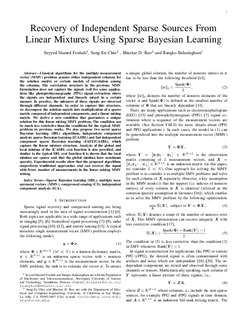Recovery of Independent Sparse Sources From Linear Mixtures Using Sparse Bayesian Learning
Journal article, Peer reviewed
Accepted version

Åpne
Permanent lenke
http://hdl.handle.net/11250/2594115Utgivelsesdato
2018Metadata
Vis full innførselSamlinger
Originalversjon
IEEE Transactions on Signal Processing. 2018, 66 (24), 6332-6346. 10.1109/TSP.2018.2875419Sammendrag
Classical algorithms for the multiple measurement vector (MMV) problem assume either independent columns for the solution matrix or certain models of correlation among
the columns. The correlation structure in the previous MMVformulation does not capture the signals well for some applications like photoplethysmography (PPG) signal extraction where
the signals are independent and linearly mixed in a certain manner. In practice, the mixtures of these signals are observed through different channels. In order to capture this structure,
we decompose the solution matrix into multiplication of a sparse matrix composed of independent components, and a linear mixing matrix. We derive a new condition that guarantees a unique
solution for this linear mixing MMV problem. The condition can be much less restrictive than the conditions for the typical MMV problem in previous works. We also propose two novel sparse
Bayesian learning (SBL) algorithms, independent component analysis sparse Bayesian learning (ICASBL) and fast independent component sparse Bayesian learning (FASTICASBL), which
capture the linear mixture structure. Analysis of the global and local minima of the ICASBL cost function is also provided, and similar to the typical SBL cost function it is shown that the local
minima are sparse and that the global minima have maximum sparsity. Experimental results show that the proposed algorithms outperform traditional approaches and can recover the signal
with fewer number of measurements in the linear mixing MMV setting.